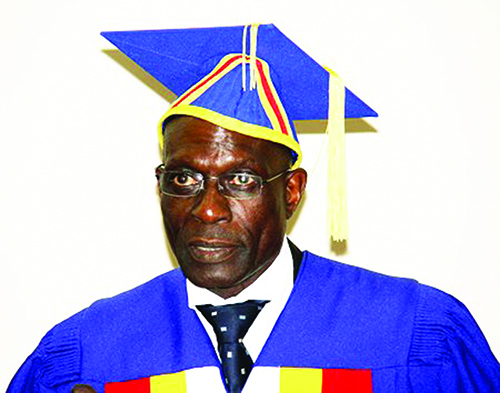UNIVERSITY of Namibia School of Medicine students yesterday blamed management for messing up the programme, saying there is nothing wrong with the lecturers or the facilities.
The students spoke a day after The Namibian published a story about the complaints raised by a number of medical specialists over the manner the Dean of the School, Professor Peter Nyarango (photo), was running the institution.
Nyarango, however, told The Namibian yesterday that all the accusations being raised by the specialists were part of attempts to have him fired from his job.
The specialists, in their letter to the health permanent secretary Andrew Ndishishi, listed a number of preconditions for them to continue their relationship with the school.
Some of the demands are that the syllabus should be coherent, cohesive and balanced; that the number of students should be reduced to at least 60 per intake; that a definite faculty, which conforms to international standards should be established; and that the examination structure be reformed completely.
The students, who spoke on condition of anonymity, said they feared that their qualifications would only be recognised in Namibia since the school of medicine is not registered with the World Health Organisation.
They also said what is happening at the school is a result of a power struggle within management, and that Nyarango was not forthcoming with solutions to concerns they raised.
In addition, the students confirmed they were being passed even when a certain percentage of the class would have failed a test or an assignment. They cited one example of a bio-chemistry test where most of them failed and were told that “it would be dealt with” and than the next thing they saw was that they had all passed.
Nyarango, however, said “no medical school in the world is perfect”. “The same goes for the students. Some are from previously disadvantaged families, while some are slow learners – we have to consider that,” he said, adding: “The medical school is like building a ship. We will go to the first floor when we are done with the ground floor.”
According to Nyarango, all the complaints were coming up now because he has been “an obstacle to them [specialists]”. “The cake will be too small for them [specialists]. They fear competition,” Nyarando further said.
He also said the people who insisted on shelving plans to start a medical school are the same who are now demanding reforms, and they were also among those complaining about the curriculum even though they were part of the steering committee that approved the syllabus four years ago.
That steering committee, according to the dean, also decided to get away with the zero year, which would make students study for six years, compared to the current five.
He said the institution has roped in various international experts including those from WHO who advised them to alter the curriculum to be a competency based curriculum from the content based one which they currently have.
“We are currently working on reforming and that will be done slowly,” he said, accusing some of the specialists of dodging him when he wanted to consult them on how to improve the work of the institution.
“They always had excuses on why they could not attend,” he charged, insisting that there are plans to oust him as the school is making progress and they want to be part of it.
“The seeds of wanting me out of the door were planted the day I was appointed,” he claimed.
He said some of the specialists, among those some who wanted reforms two years ago, wanted the school of medicine to be discontinued because of his insistence that students should be promoted to the next stage, despite failing a subject such as anatomy.
Nyarango said that 200 doctors are set to graduate at the school in the next three years, and this will threaten the commercial interests of most of the doctors who are now complaining.
On the demand by the specialists that the intake should be reduced to 60 students per year, Nyarango said there is no way the school would accept this because it is being done in the interest of the health service.
He said if the specialists say there are no enough places for internships, where will the 136 medical students sent to Russia and 116 who are in Cuba be accommodated.
Nyarango warned that Namibia can no longer underestimate its capability like it did when it dropped plans to construct the medical school in the 90s and early 2000s.
He dismissed the students’ claims of a power struggle and accused some specialists of undermining and demoralising students through remarks such as “you will not do your internship at our ward”.
“Demonising the students for the purpose of seeing me out of the system will not work, it will just affect the students in the long run,” he said.
Nyarango, however, said the school’s management would call for a meeting with the specialists to discuss some of their preconditions.
Ndishishi, who confirmed receiving the letter from the specialists, told The Namibian on Wednesday that he would meet the school of medicine management next Thursday to discuss the preconditions set by the specialists.
The Namibian understands the specialists drafted the letter to Ndishishi last Thursday when they learnt that Nyarango would be meeting the PS. Another letter was allegedly delivered to State House by the specialists the following day.
Stay informed with The Namibian – your source for credible journalism. Get in-depth reporting and opinions for
only N$85 a month. Invest in journalism, invest in democracy –
Subscribe Now!










